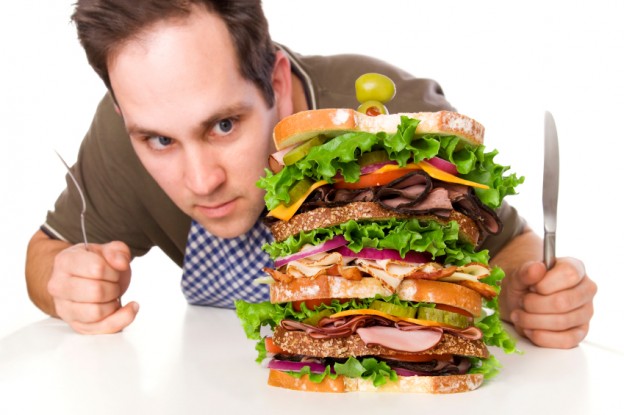By Anthoney J. Andersen – Steroidal.com
Stress and anxiety can be extremely harmful on your health. But when you combine a mountain of fatty, unhealthy food, to help cope with the dread of reality, you increase your risks of fatal diseases.
Overeating, also known as binge eating, is a way that many Americans dispose of life’s stresses and problems.
However, going down this route will not only send your stress levels soaring into the next stratosphere, but it can leave you feeling much worse about yourself as you gaze at the round-bellied shell of your former self.
STRESS AND APPETITE
Remember a bad breakup you had? Or the time you were laid off from a job you dedicated 20 years of your life to?
These are just a few situations that can high rocket your anxiety and stress levels into overdrive.
But why do most of our instincts tell us to rush toward the tub of ice cream? Or the bag of chips?
 As it turns out, there’s a correlation between the brain and stress levels that push us toward those delicious, yet fattening foods.
As it turns out, there’s a correlation between the brain and stress levels that push us toward those delicious, yet fattening foods.
According to an article in Psychology Today, there’s a body-brain affiliation associated with atypical depression – the depression that makes a person desire excessive amounts of food and sleep – as opposed to garden-variety depression, which causes a loss of appetite, insomnia and weight loss.
“When we’re stressed, people go naturally to the wrong foods because they increase levels of the stress hormone cortisol,” says Heather Bauer, R.D., founder of Bestowed.com.
Individuals that are stressed tend to seek foods like chocolate and ice cream as an attempt to fracture the debilitating structure of chronic stress.
THE STRESS SYSTEM
According to WebMD, the body acquires a lot of natural intelligence in its operation. However, the body sometimes can cower and melt into a puddle of shame as it searches for the path of least resistance.
This resistance happens to be food.
To paint a more vivid picture of how the body responds to stress, consider this scenario:
It’s midnight, and you’re walking home from work after pulling a double shift at the diner.
You’re exhausted – barely coherent.
You hear footsteps creep up behind you. A couple of street toughs looking for an easy payday.
You begin to pick up speed, your heart nearly pulsating out of your chest.
Your fast paced glide has now transformed into a full on jog, as you flag down the departing bus ahead.
You hop on board – out of harms way.
When a person experiences this sort of sudden danger, his or her brain instantly gestures their body to turn out cortisol.
According to MedicineNet.com, when a person experiences duress, they find their body becoming alert and observant, as the blood vessels constrict and deflect the flow of blood from processes like digestion to fast-acting muscles.
Metabolism is also affected in the process, as energy is made steadily available to your muscles, preparing them for battle.
After a period of time, your body’s stress response system returns to normal, as cortisol levels are depleted when the brain terminates the body’s production of the hormone.
Chronic stress, however, is a different cup of tea. Researchers at the University of California at San Francisco have concluded that during periods of chronic stress, the body’s stress response system doesn’t turn off.
The body continues to pump out cortisol, as the person begins to experience high levels of anxiety, stress and depression.
In response to this, the person turns to “comfort foods.” After they feel momentarily satisfied, they may then turn down the blinds and shelter themselves from the world by falling into a deep slumber.
After they wake, they repeat the cycle all over again.
CONCLUSION
When you look at the nitty-gritty of it all, you realize that life can sometimes be a volcanic wasteland of twists and turns. It’s how you decide to deal with those obstacles that define you as a person.
Taking up a hobby, exercising or meditating, are just a few health conscious examples that can help deter your body’s natural urges to abscond with all the sugary treats from the pantry.
Choosing to binge eat can increase the risk of heart disease, cardiovascular disease and adult onset diabetes – all of which can be a fatal response to your overindulgence.
Be smart. Remain strong.
But most importantly – stay healthy.







